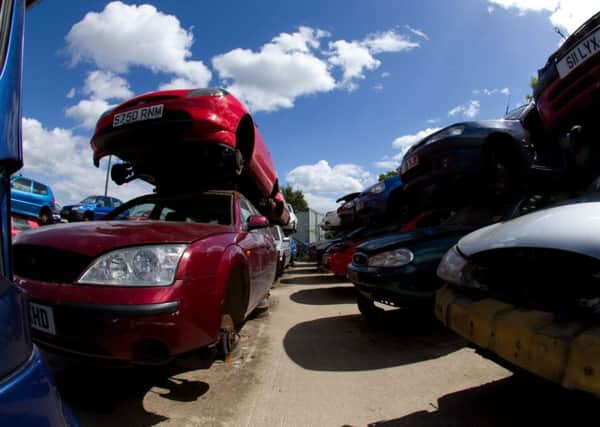Tighter laws on airguns could boost car recycling


Around two million of the UK’s 33 million cars reach the end of the road every year. But if not properly disposed of, unwanted motors can cause toxic pollution as well as a headache for owners.
Rocketing scrap metal prices in the past decade saw a rise in thefts of even the most dilapidated vehicles by criminal gangs, often resulting in hazardous components being improperly disposed of.
Advertisement
Hide AdAdvertisement
Hide AdWaste oil and fuel, batteries, brake fluids, antifreeze, heavy metals contained in electronic parts and tyres are all potentially harmful to the environment or human health.
There are no reliable figures available, but estimates suggest only about half of “end of life” vehicles are recycled through official channels and there could be as many as 350,000 lying rusting in drives and gardens around the UK.
Now a new bill passed in Scotland last month could help clean up the problem.
The Air Weapons and Licensing (Scotland) Bill will alter rules affecting everything from weapons, alcohol sales and taxis to sexual entertainment and scrap dealers.
The legislation will end cash payments and require valid proof of identification or licensing to be provided when buying and selling scrap.
It was created in an attempt to stamp out metal theft but should also ensure vehicles are decommissioned through legitimate channels.
This year the government introduced tougher recycling targets, meaning 95 per cent of a car must be recycled.
Authorised dismantlers will remove parts that can be sold for reuse, remove potentially polluting materials and sell the hulk to a shredding operation.
Advertisement
Hide AdAdvertisement
Hide AdMetals are removed by magnetic separation or by hand.The leftovers, including plastics, foam and rubber, generally go to landfill.
The car dismantling industry and disposal of associated hazardous waste is regulated by the Scottish Environment Protection Agency (Sepa).
“The new bill should make it harder for financial gain to be realised through illegal scrap metal activities, by removing the cash element and allowing more traceability,” according to a Sepa spokesman.
“All legitimate metal dealers operating from fixed sites should have waste management licences and legitimate itinerant metal dealers should be registered waste carriers. Metal dealers operating outwith these controls would be doing so illegally.”
One of the ways to make sure your vehicle is correctly disposed of is to contact licensed scrap vehicle recyclers Autogreen and CarTakeBack, which are authorised by manufacturers to uplift dud vehicles and take them to authorised treatment centres for scrapping.
The value of scrap steel is currently around £65 a tonne, and an average family car could fetch around £100 in Scotland’s cities, although the price falls to nearer £70 when you reach more remote areas, such as Wick.
Jahan Zeb, of CarTakeBack, said: “Scottish scrap laws are welcome news for those of us already trading within the law.
“When Sepa got their enforcement powers and tightened up stringent regulations we thought that was enough. However, people still managed to work around some of the regulations.
“With the cash ban, hopefully most of the illegal activity in this field will stop.”